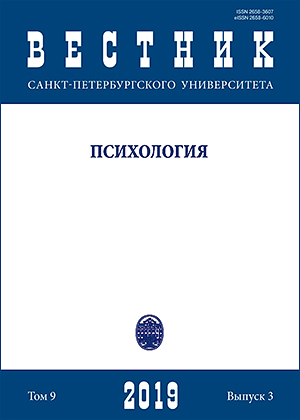Possible and Impossible selves: a conceptual framework
DOI:
https://doi.org/10.21638/spbu16.2019.304Abstract
A developed concept of the Possible self reflects the need for a closer investigation of the desires, fears, possibilities and cognitive representations related to man’s future. The motivational aspect of the construct, which can affect behavior, is emphasized by the concept of A developed concept of the Possible self reflects the need for a closer investigation of the desires, fears, possibilities and cognitive representations related to man’s future. The motivational aspect of the construct, which can affect behavior, is emphasized by the concept of agency. According to the authors, agency can be defined as the ability to develop, maintain and expand Possible selves and is characterized by personality causality, self-regulation and control. This mechanism allows a person to decide if the selected possible image will be one to attain or to avoid. Regardless of the proactive mechanisms of Possible selves, there are situations when personality possibilities can be experienced as “impossibilities”. The phenomenon of Impossible selves was introduced in the previous empirical work of the authors and now is further theoretically elaborated within this article. The Impossible self is a manifestation of the significant Possible self, which is influenced by rumination and neuroticism, and is correlated with higher levels of negative affect and self-accusation. The unconstructive phenomena of self-reflection apparently restrain the energy of wanted Possible selves, which are normally used to facilitate motivation. The assessments of different aspects of Possible selves and personality traits were not influenced by the specific content of the possibilities, demonstrating the universal nature of the observed phenomenon. We discuss the possibilities for operationalization and the theoretical background of the construct. The conceptual framework of Impossible selves emerges from (1) the general interest for the modality of “possible” in personality psychology; (2) the core theory of Possible selves; (3) the motivational potential of the Possible selves reflected in the concept of “agency”.
Keywords:
possible selves, self-regulation, impossible selves
Downloads
References
References
of Hazel Markus. Penzenskii psikhologicheskii vestnik, 2018, vol. 1 (10). https://doi.org/10.17689/psy2018.1.8. (In Russian)
behavior. Journal of Personality, 2006, 74, pp. 16731696.https://doi.org/10.1111/j.1467‑6494.2006.00424.x
Downloads
Published
How to Cite
Issue
Section
License
Articles of "Vestnik of Saint Petersburg University. Psychology" are open access distributed under the terms of the License Agreement with Saint Petersburg State University, which permits to the authors unrestricted distribution and self-archiving free of charge.




